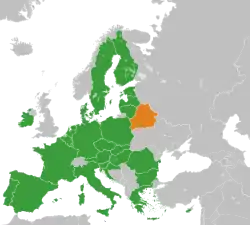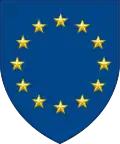Belarus–European Union relations
Euro-Belarusian relations refers to relations between the Republic of Belarus and the European Union (EU). Mutual relations were initially established after the European Economic Community recognised Belarusian independence in 1991.
 | |
EU |
Belarus |
|---|---|
After Alexander Lukashenko became Belarusian leader in 1994, the relationship between Minsk and the EU deteriorated and has remained cold and distanced, as the EU has condemned the government of Belarus several times for authoritarian and anti-democratic practices, and even imposed sanctions on the country.[1] Following a slight improvement in relations in 2008, the 2010 Belarusian presidential election (which officially saw a landslide victory of almost 80% for Lukashenko), led to mass demonstrations and arrests in Minsk. The EU declared that the imprisonment of opposition figures and protesters contravened human rights laws, and imposed new targeted sanctions on major Belarusian officials and businesspeople.[2][3][4][5][6]
Belarus is participating in the EU's Eastern Partnership. In October 2015, EU announced it would suspend most of its sanctions against Belarus.[7]
History
European Economic Commission recognised Belarusian independence in 1991, and Belarus is part of several bilateral and multilateral treaties with the European Union.[8] In 1995, Belarus and the European Union signed a Partnership and Cooperation Agreement, but this agreement wasn't ratified by the EU. Belarus is being a member of trade relations agreements based on the EU Generalized System of Preferences and the Most favoured nation.[9] Belarus is also a part of the EU's Eastern Partnership.[8]
Belarus-EU relationships began to worsen after the election of Aleksander Lukashenko in 1994; with Belarus excluded from the EU's European Neighbourhood Policy as the EU's reaction towards the establishment of authoritarian regime under president Lukashenko.[10]
The further deterioration of Belarus-EU relationships continued in the 21st century, with the European Union imposing sanctions against Belarusian officials, businessmen and several government-owned companies.[11] The sanctions were the results of political repressions following the mass protests during the 2010 presidential elections, when several members of political opposition and protesters were imprisoned and condemned to prison terms.[11]
There are notes of Belarus-EU relations' improvement.[8] Belarus has not supported Russia in its aggression towards Ukraine and released several political prisoners.[12] In 2015, the EU suspended most of the sanctions against Belarusian officials.[13] In 2016 the travelling ban imposed on Lukashenko in 2000 was lifted.[13] This decision was praised by Belarusian officials. Yet, as noted by both EU officials and international organisations, the further improvement is being decelerated due to ongoing human rights violation and political opposition suppression that are still present in Belarus.[12][14] In 2019, Lukashenko made his first official visit to the European Union since sanctions ended.[15] EU's Eastern Partnership program and further economic initiatives were discussed in Lukashenko's meeting with Austria's Sebastian Kurz.[15]
In 2016, two opposition candidates were elected to the country's parliament.[16] This was marked as a step to democratisation by several EU officials.[16]
The visa system is functioning between the EU and Belarus, with Belarusian requiring Schengen visas to entry the European Union. Belarus introduced a visa-free entry for citizens of 70 countries including the EU in 2017.[17] In 2019, it was announced that the EU would simplify requirements for obtaining Schengen visas for Belarusians, reducing its costs and time needed for application approval.[18]
Belarus-EU relations are complicated by Belarusian strong ties with Russia, who emerged as active EU critic and opponent after the annexation of Crimea in 2014.[19] Belarus is a part of Belarus-Russia Union State, as well as European-Asian Union, a customs union which includes both countries and several other CIS-members also.[19] As for today, the Belarus-Russia integration is mostly economical, with free trade and free movement zones established between the two countries, but Russia is being seen as demanding deeper political and administrative integration.[19]
Legal framework
Although the European Union and Belarus signed a Partnership and Cooperation Agreement (PCA) in 1995, which was intended to govern the mutual political and economic relations, this agreement was not ratified by the EU.[20] Furthermore, the European Union has excluded Belarus from its European Neighbourhood Policy (ENP), which was originally designed to establish a "ring of friends" in the Union's geographical proximity. Brussels has claimed this exclusion to be a direct response to the establishment of an authoritarian regime under President Lukashenko. However, EU–Belarus trade relations are still covered by the Union's Generalised System of Preferences and the most favoured nation (MFN) provisions of the 1989 Agreement between the EU and the Soviet Union.[21] Belarus is amongst the few states in Europe that have not asked for membership in the European Union. Similarly, the European Union has not offered membership to Minsk.[22] Belarus has continuously sought to further its economic and political ties with Russia, being one of the founding members of the Union State (formerly the 'Union State of Russia and Belarus').
In October 2009, a poll conducted by the independent NISEPI institute in Belarus found that 44.1 percent of the Belarusian people would vote Yes in a referendum to join the EU, compared to 26.7 percent one year earlier. Local experts are linking the swing to more pro-EU messages in Belarusian state media, Polish daily Rzeczpospolita says.
On October 30, 2015, it was announced that the EU would suspend most of its sanctions against Belarus, following the freeing of the country's political prisoners in August.[7]
Following a series of mass protests that took place after a disputed presidential election in August 2020, EU High Representative for Foreign Affairs and Security Policy Josep Borrell announced that the EU would bring in sanctions against Belarusian officials responsible for "violence and falsification".[23][24] Charles Michel, President of the European Council went further on 19 August saying the EU would soon impose sanctions on a “substantial number” of individuals responsible for violence, repression, and election fraud.[25]
See also
References
- "The EU's external relations with Belarus". European Union. Archived from the original on 13 March 2007.
- "'Time to turn the page' on EU-Belarus ties: OSCE". Archived from the original on 5 November 2012. Retrieved 20 April 2016.
- "Trend - новости Азербайджана, Грузии, Казахстана, Туркменистана, Узбекистана, Ирана, Турции". Retrieved 20 April 2016.
- "Lukashenko hails lifting of EU travel ban". Archived from the original on 5 November 2012. Retrieved 20 April 2016.
- "Trend - новости Азербайджана, Грузии, Казахстана, Туркменистана, Узбекистана, Ирана, Турции". Retrieved 20 April 2016.
- "Trend - новости Азербайджана, Грузии, Казахстана, Туркменистана, Узбекистана, Ирана, Турции". Retrieved 20 April 2016.
- BBC News. Belarus President Lukashenko: EU and US to ease sanctions. October 30, 2015
- "EEAS - Belarus Factsheet" (PDF).
- "European Commission - Belarus". 2019-04-17. Retrieved 2019-11-01.
- "The EU's relations with Belarus - Overview". web.archive.org. 2007-03-13. Retrieved 2019-11-02.
- "Belarus". EU Sanctions. Retrieved 2019-11-02.
- "Belarus: Political Prisoners Released, but Authorities Need to Do More for Human Rights". Amnesty International USA. 2015-08-31. Retrieved 2019-12-08.
- "Lukashenko hails lifting of EU travel ban". web.archive.org. 2012-11-05. Retrieved 2019-11-02.
- "Belarus 'Continues To Violate Fundamental Human Rights,' Amnesty Tells UN Committee". RadioFreeEurope/RadioLiberty. Retrieved 2019-11-02.
- "As Putin's embrace tightens, Belarus strongman reaches out to EU". Bloomberg. 2019-11-10. Retrieved 2019-12-08.
- Luhn, Alec (2016-09-12). "Belarus activists unmoved by election of two opposition MPs". The Guardian. ISSN 0261-3077. Retrieved 2019-12-08.
- "Visiting Belarus without visas | Belarus.by". www.belarus.by. Retrieved 2019-11-02.
- "Belarus Approves Visa Facilitation Draft Agreements With EU". Schengen Visa Info. 2019-09-20. Retrieved 2019-11-02.
- "Nordea trade - Belarus". 2019-10-01. Retrieved 2019-10-31.
- "Belarus - Trade - European Commission". ec.europa.eu. Retrieved 2016-01-02.
- Agreement signed between European Community and Soviet Union Archived 2008-08-04 at the Wayback Machine 1989-12-18
- Korosteleva, E.A., “The Limits of the EU Governance: Belarus ' Response to the European Neighbourhood Policy”, Contemporary Politics, Vol. 15(2), June 2009, pp. 229–45
- "Belarus election: Exiled leader calls weekend of 'peaceful rallies'". BBC News. 14 August 2020.
- "EU announces sanctions against Belarus over 'violence' on protesters and electoral 'falsification'". Euro News. 14 August 2020.
- Meredith, Sam (19 August 2020). "EU to impose sanctions on Belarusian officials for election fraud, calls for a new vote". CNBC.
External links
- Current analysis of Belarus-EU relations on Belarus Digest
- Changing Belarus (Chaillot Paper No.85) European Union Institute for Security Studies
- Back from the Cold? The EU and Belarus in 2009 (Chaillot Paper No.119) European Union Institute for Security Studies
- Belarusian News in english
- European partnership is one of external landmarks for Belarus Deutsche Welle (English version)
- Victor Shadurski (FPS): Belarus should develop economic and political ties with the EU First National Channel (Belarus) (English version)
- Kiryl Kascian. Belarus-EU Relations: Ad Hoc Actions vs. Pre-developed Strategy, Belarusian Review Working Paper, #2, November 2014

.svg.png.webp)